Santa & Cole's Ramón chair, designed by Ramón Bigas in 1975, is a metal-framed chair with a seat woven from durable synthetic rattan. Suitable for both indoor and outdoor use, this lightweight chair exudes a relaxed and carefree summer vibe and the charm of Spanish design. The Ramón chair works equally well indoors at a dining table or as an outdoor dining chair on a patio. The stackable structure makes it easy to store the chairs even in a small space.
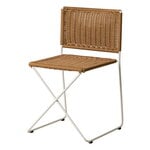
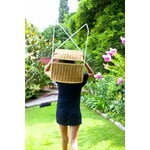
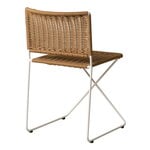
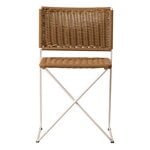
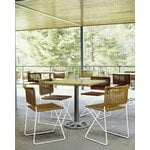
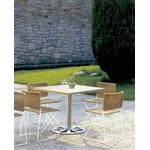
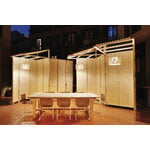
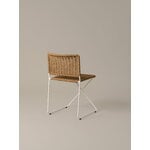
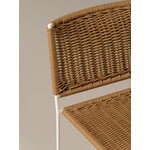
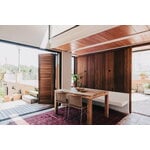
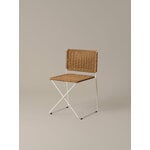
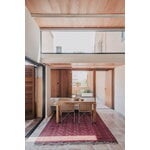
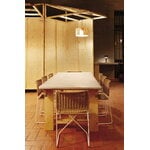
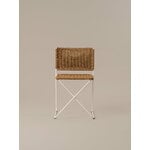
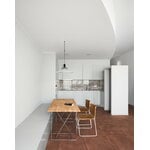
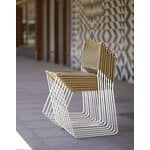
Ramón chair, natural - white
Santa & Cole
Description
Santa & Cole's Ramón chair, designed by Ramón Bigas in 1975, is a metal-framed chair with a seat woven from durable synthetic rattan. Suitable for both indoor and outdoor use, this lightweight chair exudes a relaxed and carefree summer vibe and the charm of Spanish design. The Ramón chair works equally well indoors at a dining table or as an outdoor dining chair on a patio. The stackable structure makes it easy to store the chairs even in a small space.
Product details (11)
- Colour
- Natural, white
- Width
- 45 cm
- Depth
- 46 cm
- Height
- 75 cm
- Seat height
- 44 cm
- Frame material
- Metal
- Backrest material
- Hand-woven synthetic rattan
- Seat material
- Hand-woven synthetic rattan
- Weight
- 6.6 kg
- Stackable
- Yes, recommendation 4 units
- Care instructions
-
Clean with a smooth cloth. Do not use ammonia, solvents or
abrasive cleaning products.
- Product ID
Designer
Ramón Bigas (b. 1941) is an acclaimed Spanish designer born in Barcelona. After commencing his studies in Physics at the University of Barcelona, he shifted his focus towards artistic creation. He co-founded AD (Associate Designers) with Pep Sant in 1958, and the firm quickly became one of Europe's most celebrated design companies. Bigas subsequently took on more complex projects, including designing the Spanish high-speed train (AVE) and creating the cauldron for the Olympic flame at the 1992 Barcelona Olympic Games. Bigas' designs emphasize the importance of achieving a balance between form and function. His work spans various fields, from transport to interior design.
View all productsReviews (0)
Sustainability
The Product Sustainability Framework, our criteria of sustainable design, helps you find the most sustainable products in our selection. Read below which sustainability criteria this product has met.
Working conditions & labour 9/9
-
Equal opportunities for all employees
-
Commitment to UN Global Compact, fair compensation for all employees
-
Corporate responsibility requirements defined and communicated for suppliers
-
Systematic work for improved inclusion and well-being in the workplace
-
Transparent supply chain
-
Suppliers' compliance to a code of conduct ensured
-
Direct suppliers audited and certified
-
Compliance to the UN Guiding Principles on Business and Human Rights ensured in the supply chain
-
Support for community involvement in the supply chain
Eco-friendly production 9/9
-
Fair and resource-wise water-use in production
-
No incineration or landfilling of returned items
-
No use of endangered species as materials
-
No direct environmental emissions or waste (excl. GHGs) from production
-
The sustainability of direct suppliers' production is addressed and monitored
-
Production and material sourcing that respect biodiversity, animal rights, and natural ecosystems
-
Material-efficient and ecological packaging
-
Positive impact on nature’s well-being through operations that regenerate natural ecosystems
-
No potentially harmful chemicals used in own production
Climate impact 7/8
-
Company's direct greenhouse gas emissions identified and commitment to reduction
-
Product's carbon impact identified and commitment to reduction
-
Guidance on energy- and eco-efficient use of the product
-
Contribution to climate initiatives beyond the brand’s direct operations
-
Low-carbon or compensated transportation
-
Carbon footprint of the product calculated and goals set to reduce it
-
Carbon neutral or carbon negative product
-
100 % renewable energy in own production and operations
Sustainable materials 6/6
-
Sustainable and long-lasting material choices
-
No harmful or hazardous substances
-
Responsible raw material sourcing and production
-
Materials suited for circularity: monomaterials, recyclable finishings, renewable or recycled contents etc.
-
Ecological materials: natural, biodegradable, recyclable or recycled contents
-
Outstanding materials in terms of innovativeness, responsibility, sustainability and circularity: local production or sourcing, 100 % recycled content, C2C-certification etc.
Circular design 5/5
-
High aesthetic quality promoting long-term use of the product
-
Technically durable product design and material choices
-
Design for enduring life-long quality
-
Design and support for product maintenance, repair and upgradability
-
Innovative circular design solutions: circular service system, resale platform, remanufacturing, collection of used products, etc.



















